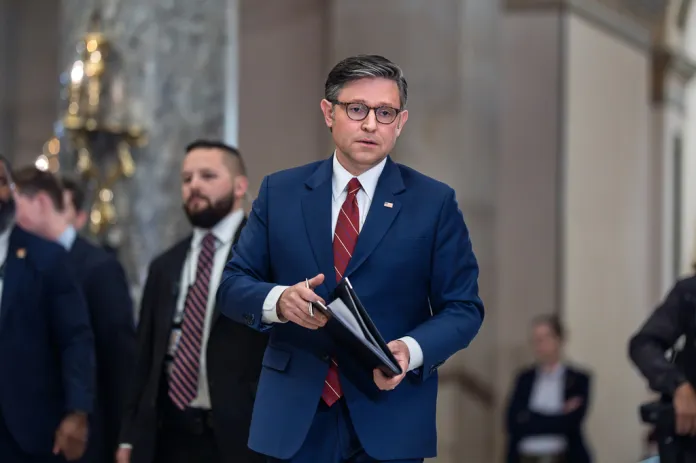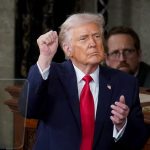The House will return to a full, five-day week of session this week after ending the longest government shutdown in United States history — and nearly eight weeks of absences on Capitol Hill have put a lot on the plate of House committee chairmen as they deal with a backlog in bills introduced before and during the shutdown.
While the House was out of session during the shutdown, members of the Republican conference were mostly at home in their districts speaking to constituents about the impacts of a “Schumer Shutdown” on the American people. Democrats, on the other hand, frequently blasted the GOP for being on an “eight-week paid vacation” while they were in Washington holding press conferences and roundtable discussions on the dangers of the Republican agenda.
Regardless of the messaging mudslinging, there is a glaring, nonpartisan fact: the House being out of session for 54 days means that not only did they not bring non-appropriations bills to the floor, but they also received a hefty slate of new bills and resolutions introduced during the shutdown that have not yet been referred to committee.
House lawmakers aren’t unaware of the daunting level of work that they are returning to. Speaker Mike Johnson (R-LA) told reporters early last week that he’s aware there is a “lot of business to do.”
“And we will be working in earnest,” Johnson said. “There’ll be long days and long nights here for the foreseeable future to make up for all this lost time that was imposed upon us.”
Rep. Mike Hardiopolos (R-FL) told the Washington Examiner he’s spoken to his committee chairmen, who have assured him they will be “hitting the ground running” and “maximizing our time in Washington, D.C.”
Hardiopolos said: “We have a lot to do and I know all of us are anxious to get back to work hard in committees and push the agenda that voters asked for in the 2024 election.”
As a way to prioritize committee time, the leadership team plans to have longer timeframes without floor votes to allow for uninterrupted committee activity, a source familiar with the matter told the Washington Examiner.
Majority Leader Steve Scalise (R-LA) told the Washington Examiner in a statement that House Republicans are “ready to make up for lost time.”
“It’s full steam ahead as we work extra hard to make up the time wasted by Democrats’ anti-Trump temper tantrum with late night votes and a fully packed schedule, ensuring we get done everything we planned to do before Democrats decided to make hardworking Americans suffer so they could have ‘leverage,’” Scalise said, adding that the House will be adding Friday votes to help with the workload.
Meanwhile, some Democrats say the backlog exposes an even more broken system in Congress, worried that the delay in voting will just be an excuse for more partisan politics.
“I’m way more concerned with the reality that committees will pass a ton of good, bipartisan bills that will never make it to the floor for a vote,” Rep. Greg Landsman (D-OH) told the Washington Examiner, saying that in the last Congress, there were “hundreds of good bills that died with the Speaker.”
He noted that, as the shutdown proved, there is “almost no coordination” between the House and the Senate.
“Lots of work that doesn’t go anywhere,” Landsman said. “It’s a big part of what’s broken about Congress.”
As of Nov. 13, 477 bills or resolutions have been introduced and not addressed in committees since Oct. 1, the start of the shutdown.

The problem? These are in addition to the hundreds filed and under consideration from committees prior to the shutdown, not including the major, overarching items like a second reconciliation package, a Farm Bill, the reauthorization of a major defense bill, and other GOP priorities due to the trifecta.
During the shutdown, House members could have voted on non-appropriations legislation on the floor despite the Senate working to reopen the government. But the speaker had insisted over the last few weeks that there was no reason to keep the House open to vote on non-funding bills because the chamber had “done its job.”
“There is plenty of time in the remainder of the calendar year to do all the things that are the must pass pieces of legislation…and we are anxious to get everybody back to regular legislative session,” Johnson said on Oct. 27.
Of his members: “Hakeem Jeffries has said they’re on vacation. Well, he might have sent the Democrats on vacation, but House Republicans are doing very important, very essential work around the clock.”
Now, the House has to deal with a bucketful of bills, and only 17 days left of session in the year, per the current schedule. Luckily, the House has already passed all 12 appropriations bills out of committee, but negotiations will need to take place in the committee and among the “four corners” to match up the House’s numbers with the Senate’s.
Among the 477 bills introduced are a handful that sought to provide relief to federal workers and recipients of food assistance programs while the shutdown continued, so it’s likely these will not get a vote, given that the shutdown has ended.
Among the shutdown-specific bills were legislation such as the Government Shutdown Efficiency Act, introduced by Rep. Eric Burlison (R-MO), that gave the president the authority to sell federal real property during a lapse in funding. Rep. Melanie Stansbury (D-NM), as well as other Democratic members of the New Mexico delegation, introduced the SNAP BACK Act that would guarantee Supplemental Nutrition Assistance Program benefits during a shutdown.
Eyes will be on some more contentious pieces of legislation, like the MAMDANI Act from Rep. Earl “Buddy” Carter (R-GA), to see whether they make their way through their respective committees. Carter’s bill would limit the providing of federal funds to New York City while Zohran Mamdani serves as mayor. This bill may also not have legs in the House, given some Republican pushback.
With the House on recess, there’s been no hearings, no committee hearings, and no action unrelated to the shutdown — including the swearing-in of Rep. Adelita Grijalva (D-AZ), which finally happened on Wednesday.
“During this shutdown, Congress was stalled from doing the People’s work—supporting our farmers, strengthening our banking and housing policies, and securing critical extensions of the National Flood Insurance Program and Defense Production Act,” Financial Services Chairman Committee French Hill (R-AR) said in a statement. “Instead, we lost weeks’ worth of activity – at a critical time – that we can never get back because of Schumer’s shutdown.”
Hill added that the committee will remain committed on top priorities like reducing red tape for banks, tackling affordability issues, and sending “digital asset market structure legislation” to President Donald Trump’s desk.
During the shutdown, the Financial Services Committee had to postpone hearings such as “Oversight of Prudential Regulators” and “From Principles to Policy: Enabling 21st Century AI Innovation in Financial Services.”
Rep. Tim Walberg (R-MI), chairman of Education and the Workforce Committee, told the Washington Examiner that the Democrats were the ones that “[ground] our government to a halt.”
“I know our members are eager to address the big issues facing our education system and working families alike,” Walberg said. “You can expect to see us finish out the year by working on lowering college costs, improving educational outcomes for students, creating transparency within unions, removing red tape for job creators, and expanding job-training opportunities for workers.”
The shutdown didn’t stop some committees’ work. Though the House Oversight Committee hasn’t held a hearing since Sept. 18 (before the shutdown), the committee released a 90-page report on former President Joe Biden’s use of the autopen and his cognitive decline on Oct. 28, finding senior aides exercised presidential powers without his knowledge or consent.
The committee also announced it would hold transcribed interviews with the general counsels of Discord, Reddit, Steam, and Twitch because, during the shutdown, they could not appear to testify on Oct. 8 as originally scheduled.
“The House Oversight Committee never stopped working for the American People during the unprecedented Democrat Shutdown,” a spokesperson for the Oversight Committee said in the Washington Examiner. “We released our bombshell report on the Biden Autopen Presidency, revealing his aides took unauthorized executive actions amid his decline. We called on the Justice Department to conduct a thorough investigation of all executive actions signed by autopen and scrutinize key aides who took the Fifth, and also referred Biden’s personal physician to the D.C. Board of Medicine.”
“Our work will continue as the government is now open,” the spokesperson added.
A spokesperson for the House Foreign Affairs Committee told the Washington Examiner that adversaries to the U.S. “didn’t take a knee just because Democrats shut the government down.”
“The House Foreign Affairs Committee has remained focused on engaging with our allies and advancing foreign policy that puts America first. As Congress comes back into session, we will continue to work for the American people,” the spokesperson continued, pointing to a handful of hearings on the schedule for November.
Some committees are already moving full steam ahead on preparations for hearings on key priority items, such as banning congressional stock trading. The issue has received widespread bipartisan support to restrict members of Congress from trading stocks.
The House Administration Committee is holding a hearing on congressional stock trading next Wednesday, called “Taking Stock of the STOCK Act.”
CONGRESS BARRELS TOWARD NEW SHUTDOWN DEADLINE WITH ‘LACK OF TRUST’ AND LITTLE TIME
The House Judiciary Committee will hold a hearing on Wednesday as well, entitled “Restoring Law and Order in High-Crime U.S. Cities.” After the House voted to end the shutdown, the Energy and Commerce Committee announced two hearings: one on the risks and benefits of artificial intelligence chatbots on Tuesday and another on travel and tourism on Thursday.
The House is also preparing to move on a bill to release the Jeffrey Epstein files, a bill reforming the District of Columbia’s cash bail system, and legislation to repeal a last-minute Senate provision tucked into the spending deal to reopen the government next week.























